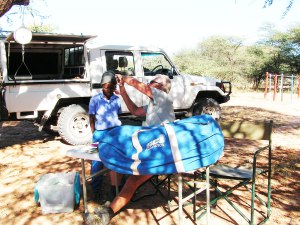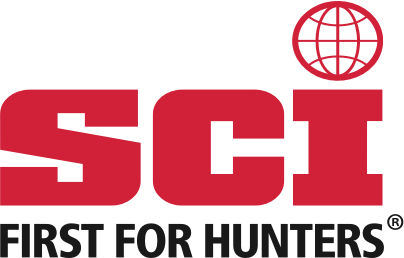Dust, daytime heat, nighttime cold, sundowners and puff adder tracks in the road, this was Namibia and the 17th trip for me to provide Safari Care – Blue Bag health care to the local residents in need. Namibia is one of the primary countries I deliver health care and supplies to because of the positive reception we get in the villages and schools. An additional bonus is the availability and ease of which I can buy medications to use on these trips.
 We concentrated our work within 100 miles of the Omborokko Mountains in North Central Namibia to hold our mobile safari clinics. This year, I welcomed help from three great volunteers, Dr. Wil Pino, Aaron Pino (Wil’s son) and Paul “Slim” Walker; all willing to give their time and energy to help deliver health care to the people of Namibia. With the additional assistance, our rolling clinic can treat more children in less time. We treated almost 600 children and approximately 20 adults on different game ranches and conservancies. The ranches were Omihe, Mount Etjo, Sukses, Otjiwa and the Otjozondjupa and Outjo conservancies.
We concentrated our work within 100 miles of the Omborokko Mountains in North Central Namibia to hold our mobile safari clinics. This year, I welcomed help from three great volunteers, Dr. Wil Pino, Aaron Pino (Wil’s son) and Paul “Slim” Walker; all willing to give their time and energy to help deliver health care to the people of Namibia. With the additional assistance, our rolling clinic can treat more children in less time. We treated almost 600 children and approximately 20 adults on different game ranches and conservancies. The ranches were Omihe, Mount Etjo, Sukses, Otjiwa and the Otjozondjupa and Outjo conservancies.
I saw some new children this year. It is easy to tell those who are new to the clinic as they hold back and cling tight to their mothers. However, things change when they get to the spring scale that they think is some new type of playground equipment. The scale swings back and forth and provides a thrill for the younger children. It isn’t until we settle the scale down that we can get an accurate weight. Having a small bit of patience let’s these youngsters have a little fun and can help put them at ease.
These clinics were setup much like a doctor’s visit but located outside. Each volunteer manned a station. Aaron would help organize patients in the que and get the names for the clinic book. Dr. Pino had just the right bit of scale-side manner to get the younger ones to feel much more at ease. He primarily worked the spring scale and would tell us the weights in Kgs, so we could get the meds ready. The next step was for Slim Walker to handle the thermometers and get each patience’s temperatures and I’d dispense the meds and nets, and we would continue to repeat the process hundreds of times.
For the most part, the children were healthy compared to other years, which is a testament to the teachers and parents absorbing the medical techniques and hygiene we have been presenting. I was pleasantly surprised by that, which also reinforced that our trips were worthwhile and making an impact on local health conditions.
As a result, we were mostly treating such aliments as upper respiratory symptoms, elevated temperatures and ear infections. We treated them with the usual children’s Tylenol, Primatene, Claritin and Zithromax. I was pleasantly surprised that we saw no eye infections, again this is a testament to good hygiene which we have been robustly educating the locals on. We also treated children for intestinal parasites with mabendazole (it kills the worms) and provided mosquito nets, which were much appreciated since the rains came late this year and there were plenty of mosquitoes.
I’ve been doing these clinics so long by myself I had forgotten how quickly you can move the children through when you have help. I’m grateful to the SCI Foundation Humanitarian Service Committee members for supporting this medical mission we perform. We just couldn’t do it without y’all. I’m sure we’ll continue as long as we can as this is such a rewarding service. For now, I have more patience as “Namibia is calling, I must go.”–Dave Lundin, RN BSN.
